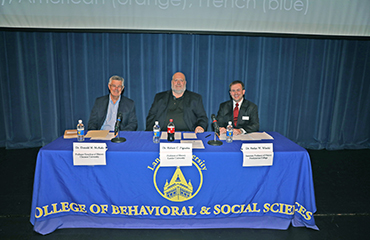
The fall of the Berlin Wall in 1989 was both "a true miracle" and an "accident," according to Presbyterian College Associate Professor of History Dr. Stefan W. Wiecki.
Wiecki, a native of West Germany, was one of two featured speakers at a Tuesday, Nov. 5 program at Lander University marking the 30-year anniversary of the event. He called it a miracle "because there was no bloodshed." Communist troops in East Berlin, with orders to shoot anyone attempting to scale the wall, shot no one, as thousands of East Germans converged on the area, drinking champagne, dancing on the wall, and attacking the wall with hammers.
The historic event was precipitated by a November 9, 1989 appearance on television by Communist party official Günter Schabowsky, who mistakenly went beyond what he was authorized to say by declaring that East Germans were free to travel, even to the west, effective immediately.
The actual party line, according to Wiecki, was that people could apply individually to travel. Party officials, he said, "wanted orderly change." The chaotic scene at the wall "was certainly not what the regime had intended."
The loosening of restraints against travel was connected to "glasnost," Soviet General Secretary Mikhail Gorbachev's policy of openness and transparency that he hoped would assist in "improving Communism and ultimately making it work." Instead, glasnost "ultimately brought down the Soviet Union," Wiecki said.
Also speaking at the event, sponsored by the College of Behavioral and Social Sciences, was Clemson University Professor Emeritus of History Dr. Donald M. McKale. He discussed the so-called "German Question," the idea that the two world wars occurred in part because the German nation became "too large, too populous, too wealthy, and too powerful to be balanced or offset effectively by the other European powers."
When the two Germanys reunited in October, 1990, less than a year after the fall of the Berlin Wall, there were fears among some in Great Britain and France that a nationalistic Germany might rise again to threaten Europe, but McKale takes a different view.
"The German government and German people appear determined and committed to lead the way in Europe in defending democracy, human rights and the European union. It's the story of a transformation that no one would have thought possible in 1945. I'm very much encouraged by it," he said.